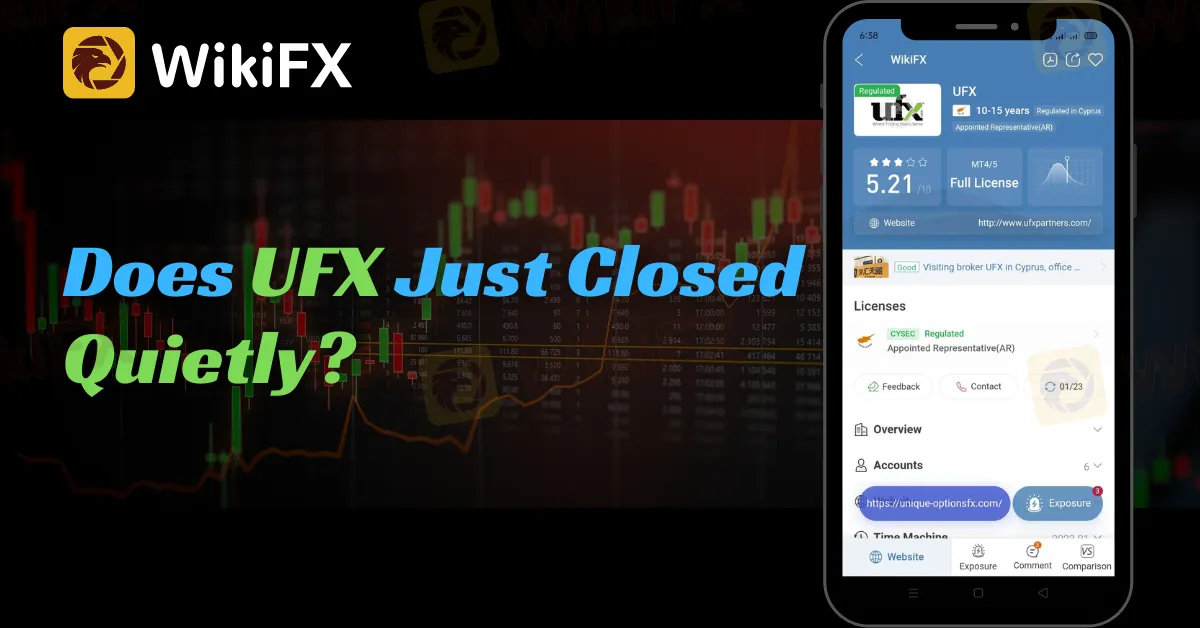简体中文
繁體中文
English
Pусский
日本語
ภาษาไทย
Tiếng Việt
Bahasa Indonesia
Español
हिन्दी
Filippiiniläinen
Français
Deutsch
Português
Türkçe
한국어
العربية
Does UFX Just Closed Quietly?
Abstract:UFX, a retail broker that offers forex and contracts for differences (CFDs) trading services, seems to have quietly closed its doors. According to a note on the company's website, "UFX is no longer providing investment services to customers in this area."

UFX, a retail broker that offers forex and contracts for differences (CFDs) trading services, seems to have quietly closed its doors. According to a note on the company's website, “UFX is no longer providing investment services to customers in this area.”
We attempted to visit the website from Europe, Asia, and Latin America, but the termination notice was the same. Furthermore, regardless of jurisdiction, the broker is not allowing anybody to register a new account.
“You must close your trading account,” according to the UFX.com website.

Renounced Cypriot Permit
The business that administered the UFX brand, Reliantco Investments Ltd, relinquished its Cyprus Investment Firm (CIF) license. The Cyprus Securities and Exchange Commission (CySEC) registration states that the regulator is now investigating “voluntary renunciation of the authorisation.” However, it is a regular procedure followed by the regulator in the case of all voluntary CIF license renunciations.

Reliantco registered three more websites with CySEC in addition to UFX.com. One of them is unavailable, while the other two are for sale.
In December 2010, the UFX operator gained CySEC approval and began operating the FX and CFDs brokerage business from its Cyprus headquarters. By passporting its Cypriot license, it provided services across the European Economic Area (EEA).
Furthermore, with a license from the Vanuatu Financial Services Commission, the brokerage operated outside of Europe, mostly in poorly regulated countries in Asia and Latin America (VFSC). However, it seems that the broker has stopped services under that license. Even when reached locally from Asia, the website displays the identical termination notice in all linguistic variations.
Furthermore, the website UFX.com seems to no longer be maintained by the broker's proprietors. Important information, such as legislation and licenses, is absent from the website, which lacks even an SSL certificate.
as stated by the source “UFX stopped accepting new clients some years ago and has not aggressively promoted or acquired new consumers since 2018. As a result, there was no longer any requirement to possess a license. This is not unusual and occurs often each year when brokers cease to operate under one regulatory body and resign their license.”
Stay tuned for more Forex Broker news.
You can install the WikiFX App on your smartphones through the download link below or from the App Store or Google Play Store.
Download link: https://www.wikifx.com/en/download.html

Disclaimer:
The views in this article only represent the author's personal views, and do not constitute investment advice on this platform. This platform does not guarantee the accuracy, completeness and timeliness of the information in the article, and will not be liable for any loss caused by the use of or reliance on the information in the article.
Read more

WikiFX Announcement: Suspension of Weekly Simulated Trading Competition
Since its launch in early 2023, the WikiFX Weekly Simulated Trading Competition has successfully hosted 99 consecutive rounds, attracting enthusiastic participation from traders worldwide and creating countless thrilling trading moments.

What Can Forex Traders Learn from Ne Zha?
The animated blockbuster Ne Zha: Birth of the Demon Child tells the story of Ne Zha’s journey to defy fate and take control of his own destiny. Beyond being an inspiring tale filled with action and character growth, the film conveys profound life lessons - many of which resonate deeply with the world of forex trading.

Retirement Savings Wiped Out: RM500,000 Lost to a Scammer named Richard Ong
A retiree was deceived into parting with more than RM500,000 after falling victim to an elaborate investment scam that promised substantial returns.

The Dark Side of Social Media Investments: How a Manager Lost RM2.08 Million
A Malaysian company manager suffered financial losses amounting to RM2.08 million after becoming the victim of an investment scam promoted through Facebook.
WikiFX Broker
Latest News
Forex Market Outlook: Key Currency Pairs and Trading Strategies for March 24–28, 2025
Singapore Police Crack Down on Scams: $1.9M Seized, 25 Arrested
Gold Prices Swing Near Record Highs
XTB Opens New Dubai Office
The Growing Threat of Fake Emails and Phishing Scams
Africa Cybercrime Bust: Over 300 Arrested in Fraud Crackdown
Hong Kong Banks and Authorities Collaborate to Freeze Fraudulent Accounts Faster
SocialFi and the Forex Market: A New Era for Decentralized Social Trading?
Is Billion Bucks Fx Scam?
BaFin Halts USDe Token Issuance, Citing Serious Compliance Failures
Currency Calculator







